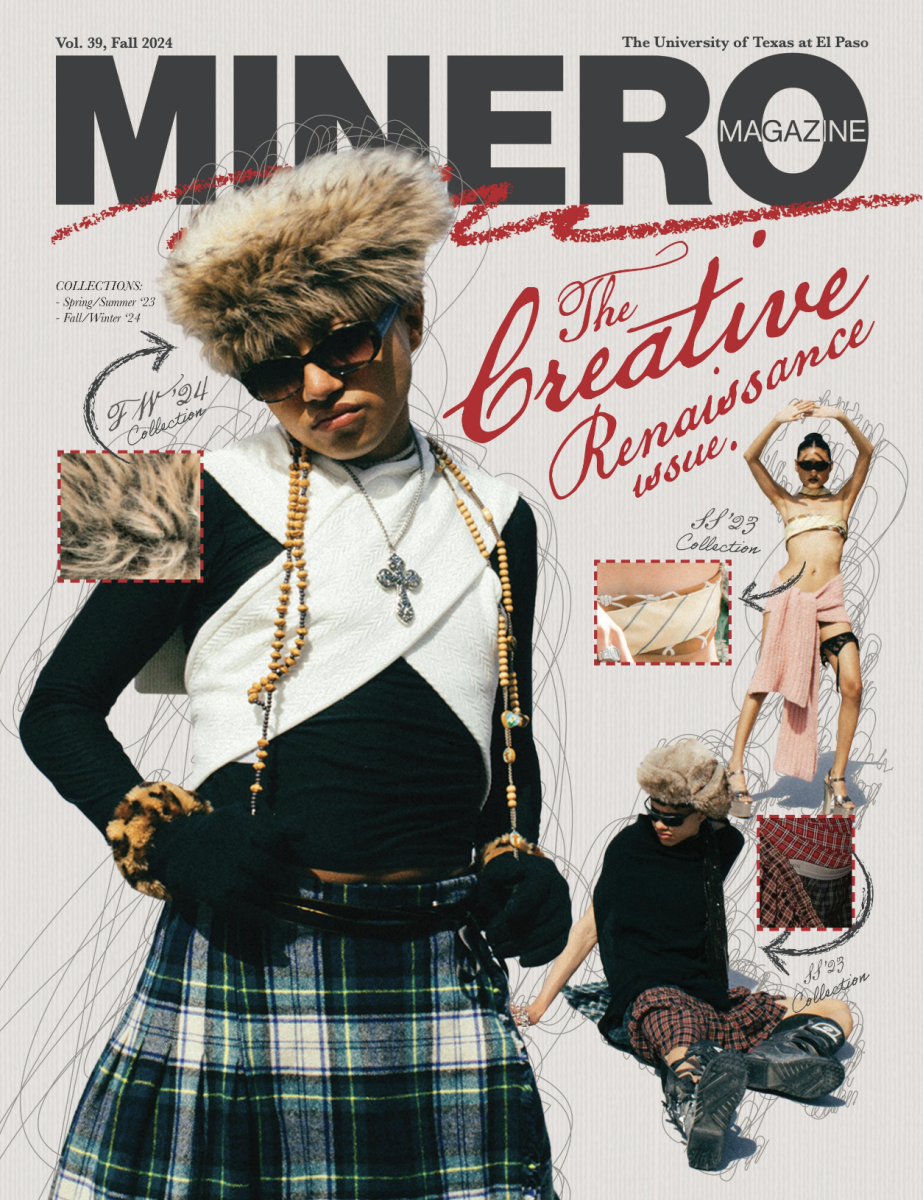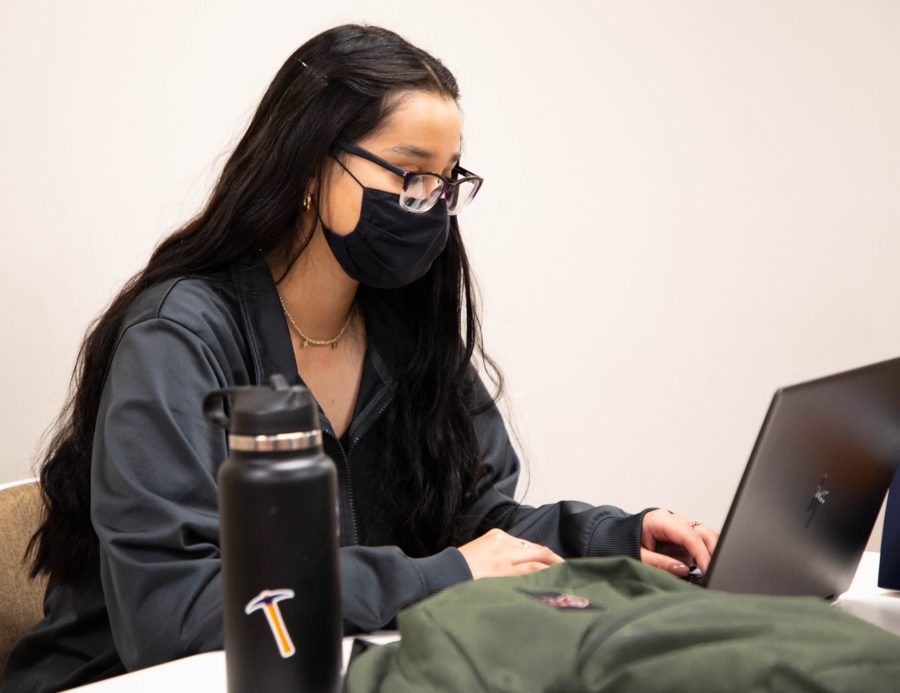Pumping iron at the crack of dawn is a typical ritual for most athletes and so is eating several meals each day. But those meals don’t need to have typical grilled chicken at all—or anything that comes from animals for that matter.
Alejandro Gutierrez is a 34-yearold psychiatric nurse practitioner, a follower of Sikhism, a UTEP alumnus and a vegan athlete.
Gutierrez wakes up every day at 4 a.m. to hit the gym for three hours before work. Then, after 5 p.m., he goes back into the gym for another two hours. He also does about 30 minutes of cardio training at some point during each workout session.
Aside from religiously exercising, the 34-year-old also has the discipline of eating at least seven protein-packed Plant-Based Muscle: meals each day — nutritious meals that contain no meat, eggs or dairy.
“Being vegan teaches you discipline, self-control and it teaches you restraint,” Gutierrez says. “If you already have those three down, coming to the gym shouldn’t be an issue, meal prepping shouldn’t be an issue and learning about different sources for amino acids and protein shouldn’t be an issue.”
A vegetarian is someone who does not consume animal meat but still eats
products derived from animals like milk and cheese, whereas a vegan is someone who does not consume anything derived from animals.
Fashion can also be considered vegan since some clothes are made with fur or other materials derived from animals. This, along with other aspects of life, make the label “vegan” a way of life rather than just a diet, since animal products can be found in more than food.
Gutierrez has been working out since he was 14 years old but became vegan in 2015, after seriously reflecting on a tragedy that struck his family years prior. He says his interest in veganism increased, after re-examining his views on life, especially those of religion.
“I had a brother that passed away in 2011. He was killed. I started studying different religions and I got away from Catholicism because, like most people here in El Paso, you’re born and raised Catholic, that’s all
you know,” Gutierrez says.“I think we need to respect all life, starting with animals.
Just because we can’t communicate with them doesn’t mean that they don’t feel pain, anger or fear.”
The vegan athlete identifies as Sikh, because he believes the religion places more value on life, coinciding with his ethical views on veganism.
Sikhism is a belief system that originated during the late 14th century in India, and the religion calls for Sikhs who have taken “Amrit,” refraining from consuming eggs, fish, or any ingredients derived from animals or cooked in animal fat.
AzadSinghFitness.com, a fitness website for Sikhs, says that a vegan diet is compatible with Sikh athletes because “many Sikhi teachings are born out of compassion” and because the diet can provide enough for an active lifestyle if done correctly.
Part of following this diet correctly consists of monitoring one’s consumption of essential nutrients like vitamin B12 and iron that are more difficult to find in a plant-based diet, the website says.
According to Sentient Media, a nonprofit media organization focused on animal rights, there are varying motives behind veganism which include: those who don’t eat meat for ethical reasons, those who don’t eat meat for the environment, and those who don’t eat meat for personal health. In any case, “the end result is the same,” according to the nonprofit.
Gutierrez believes in the notion that not consuming animals is the ultimate goal, no matter the motive, although he also thinks a vegan lifestyle is healthier, too.
“That’s a problem that I find with a lot of vegans, is that they’re too hardcore. You’re never going to change people if you don’t know how to get on their level. Be empathetic and reach across the aisle and say, ‘look, these are the reasons why you should become vegan, not just for the environment, but for yourself too,’” Gutierrez says.
Gutierrez is part of a Facebook group called “El Paso Vegans,” a group with more than 2,000 members where local vegans share which restaurants are vegan-friendly, which grocery stores have deals on certain vegan products, and tips on cooking vegan food, among many other useful tidbits of information. Members of this group not only share
recipes, recommendations and ideas, but some even make efforts to build a sense of community.
A handful of the El Paso vegans attended a “Hike and Vegan Bite” hangout near McKelligon Canyon Road Feb. 21, 2020, which was only one of several usual gatherings that have been organized for the past two years.
The organizers of these events post their plans on the social media site, meetup.com, where they then share it on Facebook pages to build the community even more.
Attendees can expect “social outings, potlucks, dinners at vegan-friendly
restaurants, cooking demos, discussions and opportunities for activism.”
Other Facebook pages include Vegan Culture of El Paso and El Paso Vegan Lifestyle, both with hundreds of members and likes.
Meanwhile, on Instagram, several pages dedicated to veganism thrive with thousands of followers amid a rise in popularity and demand for this lifestyle.
But a subgroup of veganism has also found its place in the influencer ranks of Instagram and that’s the subgroup for vegans who work out.
Ferdinand Beck is a German vegan athlete who runs a popular Instagram page called “@vegainstrength,” with more than 227,000 followers, where he shares facts on veganism, simple vegan recipes, some workout routines and many other things related to the vegan athlete lifestyle.
Beck has covered topics on the social media site like the healthiness of gluten, the best way to cook sweet potatoes, if figs are vegan and even how to prevent cavities, among several other relevant topics.
In El Paso, Gutierrez is only one of many athletes but only one of a smaller number of vegan athletes.
“I gotta say the vegan bodybuilding community is small. I’ve only met two or three other people. I’ve never actually met them at the gym. It’s usually like over Facebook or over like a common thread,” Gutierrez says. But I’ve matured to a level especially after becoming spiritually enlightened to just become a better person and be more compassionate with other animals. I think others should too, even if they don’t work out.”
By Bryan Mena
En Breve
El levantamiento de pesas al amanecer es un ritual típico para la mayoría de lxs atletas y también lo es comer varias comidas al día. Pero estas comidas no necesitan tener el típico pollo a la parrilla, ni ningún ingrediente que provenga de animales.
Alejandro Gutierrez es un enfermero psiquiátrico practicante de 34 años,
alumnus de UTEP y un atleta. Él se despierta cada día a las 4 a.m. para estar en el gimnasio durante tres horas antes del trabajo. Después, a las 5 p.m., regresa al gimnasio por otras dos horas. Gutierrez también hace 30 minutos de cardio entre cada sesión.
El atleta vegano también se identifica como Sikh, un sistema de creencias
originado en India a finales del siglo XIV que valora la vida por encima de otra cosa, incluyendo la vida de los animales. Lxs seguidores del Sikh practican “Amrit”, la práctica de abstenerse del consumo de huevos, pescado, o cualquier ingrediente derivado de animales o cocinado con
grasa animal.
“El ser vegano te enseña disciplina, control de ti mismo y te enseña moderación”, Gutierrez dice. “Si ya tienes dominado esos tres, venir al gimnasio no debería de ser problema, planear tus comidas no debería ser un problema y aprender sobre diferentes fuentes de aminoácidos y proteína no debería ser un problema”.
Gutierrez ha estado entrenando desde que tenía 14 años, pero se volvió
vegano en 2015 después de reflexionar seriamente sobre una tragedia familiar en años anteriores. Él dice que su interés en el veganismo incrementó especialmente después de cuestionar sus creencias religiosas.
“Tuve un hermano que falleció en 2011. Lo mataron”, Gutierrez dice. “Empecé a estudiar diferentes religiones y me alejé del catolicismo, porque como la mayoría de la gente aquí en El Paso, naces y creces siendo católico, es todo lo que sabes. Pienso que todos necesitamos respetar toda forma de vida, empezando con los animales. Solo porque no nos podamos comunicar con ellos, no significa que ellos no sientan dolor, enojo, o miedo”.
Según Sentient Media, una organización sin fines de lucro enfocada en los derechos de los animales, hay una serie de motivos detrás del veganismo que incluye aquellxs que no comen carne por motivos éticos, aquellxs que no la comen en favor del medio ambiente, y aquellxs que no la comen en favor de la salud personal. En cualquier caso “el resultado final es el mismo”, según Sentient Media.
Gutierrez, siendo uno de pocxs atletas veganos, cree que un estilo de vida
vegano es más saludable y que la noción de no consumir animales es la meta final, sin importar el motivo.
“Tengo que decir que la comunidad del físico culturismo vegano es pequeña. Sólo he conocido a dos o tres atletas. Pero nunca los he conocido en el gimnasio”, Gutierrez dice. “Usualmente es a través de Facebook o por un hilo en común (en Twitter). Pero he madurado a un nivel, especialmente después de volverme espiritualmente iluminado para ser una mejor persona y ser más compasivo con otros animales. Creo que los demás también deberían hacerlo, incluso si no hacen ejercicio”.
Por Bryan Mena





































